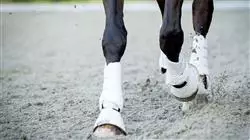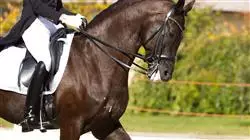University certificate
The world's largest faculty of veterinary medicine”
Introduction to the Program
Society demands veterinary professionals specialized in equines and with extensive knowledge in Exercise Physiology. Think no more and train with us”

To achieve maximum sporting performance of the horse it is important to know how to enhance the three basic capabilities of an athlete: endurance or aerobic capacity, speed or anaerobic capacity and strength. Thus, the basics of physical training and its application to the various equestrian disciplines will be presented.
Before programming a training program, it is necessary to know what level of physical fitness a particular horse is starting from. Before programming a training program, it is necessary to know what level of physical fitness a particular horse is starting from. Based on these data, a training program can be designed more precisely, a reduction in the level of physical fitness can be detected and the possible causes can be investigated before the appearance of pathologies with clinical manifestations, and the rider can be advised, helping to establish a competition strategy. In addition, the control of training intensity reduces the risk of overtraining.
A stress test is also very useful to evaluate the possible causes involved in the lack or loss of performance of a sport horse. The monitoring of the functional indices obtained from the stress test over the course of an equestrian season will allow the identification of the loss of performance towards a specific group of pathologies.
There are several pathologies that are linked to the performance of physical activity, such as heat stroke, rhabdomyolysis, exhaustion syndrome, hydroelectrolytic alterations, cardiac arrhythmias, synchronous diaphragmatic flutter, etc. It is therefore important to know how to act in the face of exhaustion syndrome, not only with regard to treatment, but also to the establishment of effective preventive measures.
This Postgraduate certificate provides students with specialized tools and skills to successfully develop their professional activity, working on key competencies such as knowledge of the reality and daily practice of the veterinary professional, and developing responsibility in the monitoring and supervision of their work, as well as communication skills in a teamwork environment.
As it is an online program, students will not be bound by fixed schedules or the need to move to another physical location, but rather, they can access the content at any time of the day, balancing their professional or personal life with their academic life.
Don't miss the opportunity to study this Postgraduate certificate in Exercise Physiology. It's the perfect opportunity to advance your career"
This Postgraduate certificate in Exercise Physiology contains the most complete and up-to-date scientific program on the market. The most important featur es include:
- The development of practical cases presented by experts in equine physiotherapy and rehabilitation
- The graphic, schematic, and practical contents with which they are created, provide scientific and practical information on the disciplines that are essential for professional development
- Practical exercises where self-assessment can be used to improve learning
- Special emphasis on innovative methodologies in Exercise Physiology
- Theoretical lessons, questions to the expert, debate forums on controversial topics, and individual reflection assignments
- Content that is accessible from any device with an Internet connection
This Postgraduate certificate is the best investment you can make when choosing a refresher programme to expand your existing knowledge in Exercise Physiology”
Its teaching staff includes professionals from the veterinary field, who bring the experience of their work to this qualification, as well as recognized specialists from leading societies and prestigious universities.
Its multimedia content, developed with the latest educational technology, will provide the professional with situated and contextual learning, i.e., a simulated environment that will provide immersive education programmed to learn in real situations.
This program is designed around Problem-Based Learning, whereby the professional must try to solve the different professional practice situations that arise throughout the program. For this purpose, the professional will be assisted by an innovative interactive video system created by renowned and experienced experts in Exercise Physiology.
This program comes with the best educational material, providing you with a contextual approach that will facilitate your learning"

This 100% online Postgraduate certificate will allow you to combine your studies with your professional work while increasing your knowledge in this field"
Why study at TECH?
TECH is the world’s largest online university. With an impressive catalog of more than 14,000 university programs available in 11 languages, it is positioned as a leader in employability, with a 99% job placement rate. In addition, it relies on an enormous faculty of more than 6,000 professors of the highest international renown.

Study at the world's largest online university and guarantee your professional success. The future starts at TECH”
The world’s best online university according to FORBES
The prestigious Forbes magazine, specialized in business and finance, has highlighted TECH as “the world's best online university” This is what they have recently stated in an article in their digital edition in which they echo the success story of this institution, “thanks to the academic offer it provides, the selection of its teaching staff, and an innovative learning method aimed at educating the professionals of the future”
A revolutionary study method, a cutting-edge faculty and a practical focus: the key to TECH's success.
The most complete study plans on the university scene
TECH offers the most complete study plans on the university scene, with syllabuses that cover fundamental concepts and, at the same time, the main scientific advances in their specific scientific areas. In addition, these programs are continuously being updated to guarantee students the academic vanguard and the most in-demand professional skills. In this way, the university's qualifications provide its graduates with a significant advantage to propel their careers to success.
TECH offers the most comprehensive and intensive study plans on the current university scene.
A world-class teaching staff
TECH's teaching staff is made up of more than 6,000 professors with the highest international recognition. Professors, researchers and top executives of multinational companies, including Isaiah Covington, performance coach of the Boston Celtics; Magda Romanska, principal investigator at Harvard MetaLAB; Ignacio Wistumba, chairman of the department of translational molecular pathology at MD Anderson Cancer Center; and D.W. Pine, creative director of TIME magazine, among others.
Internationally renowned experts, specialized in different branches of Health, Technology, Communication and Business, form part of the TECH faculty.
A unique learning method
TECH is the first university to use Relearning in all its programs. It is the best online learning methodology, accredited with international teaching quality certifications, provided by prestigious educational agencies. In addition, this disruptive educational model is complemented with the “Case Method”, thereby setting up a unique online teaching strategy. Innovative teaching resources are also implemented, including detailed videos, infographics and interactive summaries.
TECH combines Relearning and the Case Method in all its university programs to guarantee excellent theoretical and practical learning, studying whenever and wherever you want.
The world's largest online university
TECH is the world’s largest online university. We are the largest educational institution, with the best and widest online educational catalog, one hundred percent online and covering the vast majority of areas of knowledge. We offer a large selection of our own degrees and accredited online undergraduate and postgraduate degrees. In total, more than 14,000 university degrees, in eleven different languages, make us the largest educational largest in the world.
TECH has the world's most extensive catalog of academic and official programs, available in more than 11 languages.
Google Premier Partner
The American technology giant has awarded TECH the Google Google Premier Partner badge. This award, which is only available to 3% of the world's companies, highlights the efficient, flexible and tailored experience that this university provides to students. The recognition as a Google Premier Partner not only accredits the maximum rigor, performance and investment in TECH's digital infrastructures, but also places this university as one of the world's leading technology companies.
Google has positioned TECH in the top 3% of the world's most important technology companies by awarding it its Google Premier Partner badge.
The official online university of the NBA
TECH is the official online university of the NBA. Thanks to our agreement with the biggest league in basketball, we offer our students exclusive university programs, as well as a wide variety of educational resources focused on the business of the league and other areas of the sports industry. Each program is made up of a uniquely designed syllabus and features exceptional guest hosts: professionals with a distinguished sports background who will offer their expertise on the most relevant topics.
TECH has been selected by the NBA, the world's top basketball league, as its official online university.
The top-rated university by its students
Students have positioned TECH as the world's top-rated university on the main review websites, with a highest rating of 4.9 out of 5, obtained from more than 1,000 reviews. These results consolidate TECH as the benchmark university institution at an international level, reflecting the excellence and positive impact of its educational model.” reflecting the excellence and positive impact of its educational model.”
TECH is the world’s top-rated university by its students.
Leaders in employability
TECH has managed to become the leading university in employability. 99% of its students obtain jobs in the academic field they have studied, within one year of completing any of the university's programs. A similar number achieve immediate career enhancement. All this thanks to a study methodology that bases its effectiveness on the acquisition of practical skills, which are absolutely necessary for professional development.
99% of TECH graduates find a job within a year of completing their studies.
Postgraduate Certificate in Exercise Physiology
The TECH Global University's Faculty of Veterinary Medicine offers a Postgraduate Certificate in Exercise Physiology designed to plan and time a training program in equine animals, specifically for the horse. The objectives are to classify the physical levels of horses, competitive purposes and type of equestrian discipline, design stress tests according to statistical parameters, establish diagnostic protocols for horses with a loss, reduction or lack of athletic performance. In addition to developing a protocol for the treatment and prevention of pathologies associated with exercise, including overtraining syndrome.
The best postgraduate course in sport physiology in horses
To achieve the maximum sporting performance of a horse it is important to know how to enhance three basic aptitudes: endurance or aerobic capacity, speed or anaerobic capacity, and strength. To this end, the TECH Global University postgraduate course prepares veterinary professionals with knowledge of the following concepts: systemic adaptations to training, design of stress tests to assess the animal's physical condition, physiological parameters to be monitored during training, factors limiting sports performance and excessive fatigue, or exhaustion derived from pathologies associated with physical exercise, among others.







